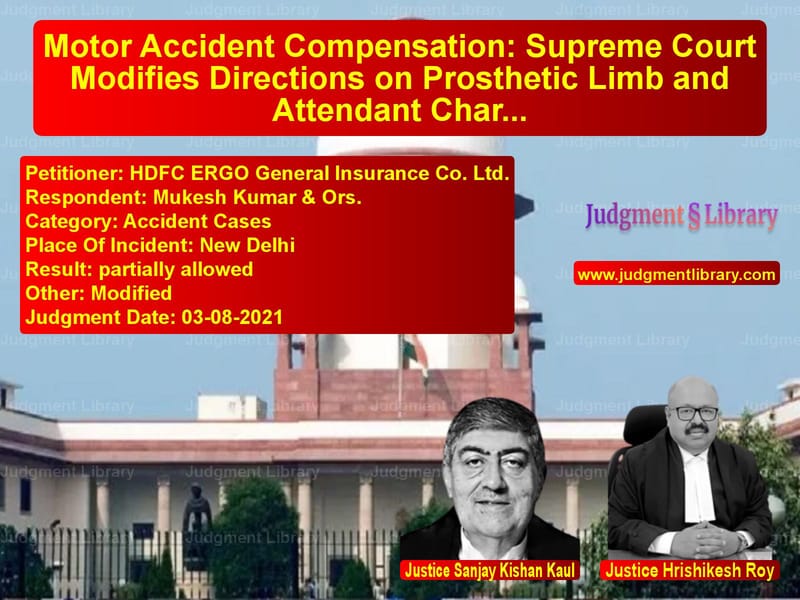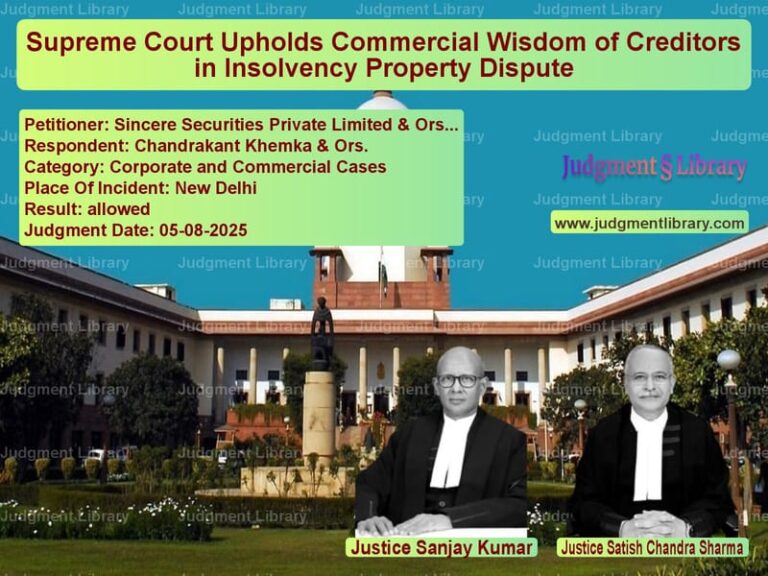Motor Accident Compensation: Supreme Court Modifies Directions on Prosthetic Limb and Attendant Charges
The case of HDFC ERGO General Insurance Co. Ltd. vs. Mukesh Kumar & Ors. revolved around a crucial question: whether courts can issue continuing directives for lifelong maintenance of a prosthetic limb or ongoing financial support for attendants in motor accident compensation cases. The Supreme Court ruled that such directions must be part of a one-time compensation assessment rather than a perpetual obligation on the insurance company.
Background of the Case
The respondent, Mukesh Kumar, was 19 years old when he suffered an accident on August 25, 2017, resulting in a 100% permanent disability of his right lower limb. His leg had to be amputated below the knee, requiring a prosthetic limb for mobility. The Motor Accident Claims Tribunal (MACT) awarded him Rs. 2 lakhs for loss of amenities and disfigurement, including prosthetic limb expenses.
Upon appeal, the Delhi High Court modified the award, directing HDFC ERGO General Insurance to provide a high-quality prosthetic limb with a lifetime warranty and ensure its repair or replacement whenever needed. Additionally, the insurer was required to contact Mukesh Kumar twice a year to check the limb’s condition and respond to any repair requests.
In a related case, the High Court further directed the insurer to provide for two semi-skilled attendants for a differently-abled claimant for the rest of his life. To fulfill this, the insurance company was instructed to deposit Rs. 60 lakhs in an interest-bearing account to generate Rs. 50,000 per month as minimum wages for the attendants.
HDFC ERGO challenged these rulings before the Supreme Court.
Arguments by the Petitioner (HDFC ERGO General Insurance Co. Ltd.)
- The insurer argued that there is no legal provision mandating a continuing obligation for prosthetic limb maintenance.
- “Compensation under the Motor Vehicles Act, 1988, is awarded as a one-time settlement. There is no scope for issuing directives in perpetuity.”
- The High Court’s requirement for a ‘lifetime warranty’ on the prosthetic limb was unrealistic, as no such warranty exists.
- The direction to deposit Rs. 60 lakhs for attendant charges was excessive and not in line with judicial precedents.
Arguments by the Respondents
- The claimant argued that a prosthetic limb requires ongoing maintenance, and the insurer should bear the cost since the injury resulted from an insured motor accident.
- “Ensuring long-term functionality of the prosthetic limb is essential for quality of life, and the court was correct in issuing continuous maintenance directions.”
- Regarding the attendant charges, the respondents argued that lifelong assistance was necessary for daily activities.
Supreme Court’s Analysis
The Supreme Court examined two key issues:
1. Can a court issue a lifelong obligation for prosthetic limb maintenance?
- The Court ruled that compensation must be determined as a lump sum award rather than through ongoing directives.
- “While future medical expenses should be considered, compensation cannot be an indefinite obligation requiring insurers to provide continuous services.”
- The Court set aside the High Court’s direction for a ‘lifetime warranty’ on the prosthetic limb.
- “Instead of an open-ended maintenance duty, a lump sum amount should be awarded to cover expected future replacements and repairs.”
2. Should the insurance company be required to provide lifelong attendant charges?
- The Court noted that while severe disabilities necessitate ongoing care, the method of compensation must be a one-time payment.
- “The High Court erred in creating a perpetual financial obligation on the insurance company. Instead, a lump sum amount should be awarded based on expected expenses.”
- The Court cited Kajal v. Jagdish Chand (2020), where it had used a multiplier method to determine attendant charges rather than issuing a perpetual directive.
Supreme Court’s Judgment
The Supreme Court ruled:
- “The impugned directions of the High Court requiring lifetime warranty for the prosthetic limb and periodic check-ins by the insurer are set aside.”
- “The provision for attendant charges should be determined using the multiplier method, as outlined in Kajal v. Jagdish Chand.”
- “The High Court shall quantify a lump sum amount for future prosthetic limb maintenance and attendant costs instead of imposing an indefinite financial obligation on the insurer.”
Conclusion
The Supreme Court reaffirmed that motor accident compensation must be a one-time determination based on reasonable estimates of future expenses. The ruling prevents courts from imposing open-ended obligations on insurers while ensuring fair compensation for accident victims.
Petitioner Name: HDFC ERGO General Insurance Co. Ltd..Respondent Name: Mukesh Kumar & Ors..Judgment By: Justice Sanjay Kishan Kaul, Justice Hrishikesh Roy.Place Of Incident: New Delhi.Judgment Date: 03-08-2021.
Don’t miss out on the full details! Download the complete judgment in PDF format below and gain valuable insights instantly!
Download Judgment: hdfc-ergo-general-in-vs-mukesh-kumar-&-ors.-supreme-court-of-india-judgment-dated-03-08-2021.pdf
Directly Download Judgment: Directly download this Judgment
See all petitions in Compensation Disputes
See all petitions in Negligence Claims
See all petitions in Motor Vehicle Act
See all petitions in Judgment by Sanjay Kishan Kaul
See all petitions in Judgment by Hrishikesh Roy
See all petitions in partially allowed
See all petitions in Modified
See all petitions in supreme court of India judgments August 2021
See all petitions in 2021 judgments
See all posts in Accident Cases Category
See all allowed petitions in Accident Cases Category
See all Dismissed petitions in Accident Cases Category
See all partially allowed petitions in Accident Cases Category







